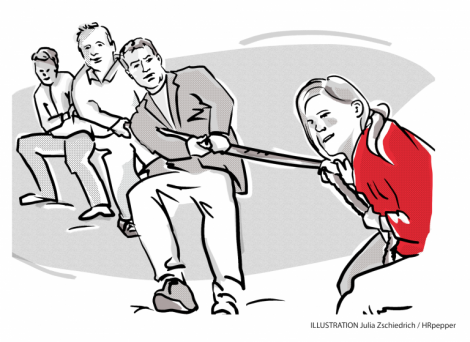Males do (not) always negotiate better than females

Almost everything is a matter of negotiation, regardless of whether it concerns the own salary, the next career opportunity or the collaboration of organizations. However, who is more successful in these negotiations – males or females? If one looks at the still existing gender pay gap or the small amount of females in top management positions, obviously the answer in favor of males. Nevertheless, this answer might not be sufficient because it is based on deeply rooted social norms and gender role stereotypes without considering the specific context of a particular negotiation. Hence, the question arises whether males are more successful in every situation. Put differently, do females negotiate more successful than males under specific circumstances?
Taking the rationale of role congruity theory into account (Eagly & Karau, 2002), males behave more successful in negotiations because they are considered to have agentic characteristics (e.g., assertiveness, negotiation skills, willingness to take chances). Previous meta-analytic results concerning gender differences in economic negotiations support this notion (Stuhlmacher & Walters, 1999; Walters et al., 1998). However, the effect size of this gender difference is relatively small. A recently published meta-analysis about gender differences in negotiation outcomes summarizes the previously published meta-analytical results (21 primary studies with 3,500 participants at that time) and the newly published studies (now 51 studies with more than 10,000 participants; see Mazei et al., 2015). Again, the new results show that males are more successful than females in economic negotiations on average; however, the effect size of the gender difference is still small (effect size = 0.20). If one considers the variation of the effect sizes among all studies, the results vary between -0.41 (i.e., in favor of females) and 0.80 (in favor of males). Thus, there have to exist certain contextual factors, namely moderators, that should explain this variation (Mazei et al., 2015).
The authors identify the following significant moderators: (a) persons negotiate on behalf of themselves and of an organization respectively or on behalf of another person, (b) persons have information about the negotiation range or not, and (c) persons already have negotiation experience or not. Each of these moderators diminishes the gender difference in negotiations in favor of females. For example, if persons have negotiation experience, the gender differences between males and females disappear. The same is true for the two other moderators.
The strongest effects were found in situations of the highest vs. lowest role incongruity of females. The largest gender differences favoring males yield to the highest role incongruity for females. This situation occurs if persons negotiate on behalf of themselves or on behalf of an organization, have no information about the negotiation range, and have no negotiation experience. Under the highest role incongruity for females, hence, males negotiate more successful than females. Conversely, the lowest role incongruity for females occurs if persons negotiate on behalf of another person, have information about the negotiation range, and are experienced. Under this situation of lowest role incongruity for females, the gender difference is even reversed favoring females in economic negotiations.
Although males are more successful than females in economic negotiation on average, the gender difference is eliminated or even reversed if one considers the context of the specific negotiation. In particular, females might benefit more than males from negotiation trainings or simulations. Similarly, females should be informed more in-depth about their negotiation range and they should be better prepared for negotiations. The authors of this new meta-analysis however point at the issue that all training and preparation activities should avoid making females negotiate too assertively. Females’ assertiveness can lead to a social backlash that negatively influences negotiation outcomes because females negotiating assertively is incongruent to their social role according to role congruity theory.
Sources:

